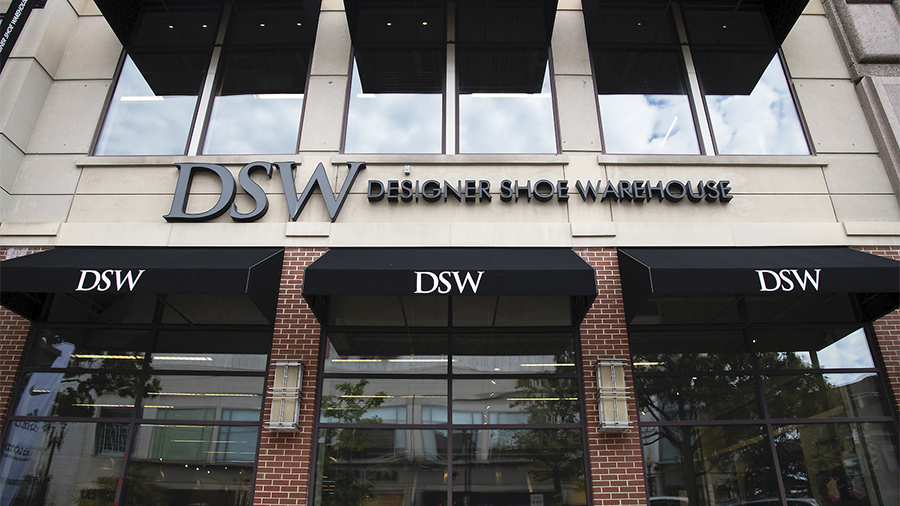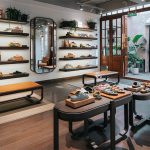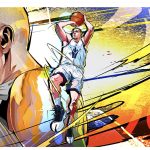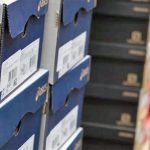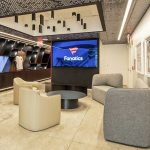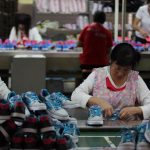At its Investor Day, Designer Brands, Inc., the parent of DSW, unveiled an ambitious plan to double sales of its owned brands by fiscal 2026 while also planning to invest in national brands to elevate the DSW experience.
At the event held Friday at the New York Stock Exchange, Roger Rawlins, CEO, discussed Designer Brands’ evolution marked by the October 2018 acquisition of Camuto Group. The acquisition was done in partnership with Authentic Brands Group and led to Designer Brands’ owning or securing the footwear licensing rights to Vince Camuto, Lucky, Jennifer Lopez, Jessica Simpson, and Louise et Cie.
Rawlins noted that about 20 years ago, the company’s flagship DSW chain was founded with a foremost focus on offering an unparalleled assortment of brands.
“We were the first company to create this massive assortment of products that we put on the selling floor,” said Rawlins. “We had this open-sell environment where you did not have to have an associate come up and help you put on the shoes. They were all there. We also had value. We had fashion and value. That was sort of piece number one of everything we did.”
A second focus for DSW was rapid expansion, with the chain reaching over 700 locations across North America under the DSW name, along with a few The Shoe Company locations in Canada. In 2021, Designer also recorded a milestone with $1 billion in e-commerce sales, up from $35 million in the first year of online operations 15 years ago.
Finally, DSW’s success has long benefited from its loyalty efforts. Rawlins said, “We started our company with a punch program where when you came in and bought a shoe, like a pizza place might still have. You would go ahead and click that, and then after so many times, you earn dollars or free shoes. That’s embedded in how we operate. It’s how we breathe every single day as a retail operation. Loyalty was grounded in us.”
Rawlins said those elements helped DSW become a $3 billion enterprise over 25 years. However, Designer Brands’ executive team in 2016 recognized that the company needed to evolve as mobile phones and other technologies were altering consumer behavior.
“We went to our board and said what we’ve spent 20 some years doing is not going to get us to ‘Next,’” said Rawlins. “We have to evolve our business model primarily for one reason—the consumer is changing.”
He noted that from 2011 through 2017, five companies or groups of companies grew market share in the footwear space.
First, DSW grew market share by 20 basis points as the off-pricer opened about 300 stores over that period. Second, a group of athletic-inspired retailers defined by Foot Locker, Champs Sports and Dick’s Sporting Goods, Shoe Carnival, and Famous Footwear grew share by 70 basis points, reflecting strengthening demand for athleisure products. Third, Nordstrom gained 150 basis points over the period as Nordstrom Rack’s expansion was accelerated. Fourth, Amazon grew 590 basis points as the platform solidified its position as e-commerce’s top player.
However, the strongest growth was footwear brands going direct-to-consumer (DTC) with collective gains of 1170 basis points from 2011 through 2017. Said Rawlins, “These are our partners that are going to do that. While we’re investing a billion dollars in opening stores, they’re going DTC. Think about what the Swoosh (Nike) did. They opened stores. They opened a website. They told people, “We love you,” but then they turned around and sold DTC. Today, roughly 20 percent or one out of every five pairs of shoes are purchased direct from a brand.”
Designer Brands decided it needed a stronger DTC approach.
The company explored acquiring Nine West Group, acquired by Authentic Brands Group, and eventually acquired Camuto Group, which stood out for its Vince Camuto, Jessica Simpson and Lucky footwear brands. Rawlings said, “That’s who we needed to go get. Why? Because we had this foundation that we had invested in for 25 years building, this infrastructure called DSW, that we can layer Camuto on top of to go DTC. Why go DTC? Because everyone is. We had to change our model in a meaningful way. So that’s why we acquired Camuto.”
He added that Designer Brands’ results over the back half of 2021 and the start of spring this year demonstrated the advantages of brand ownership. Said Rawlins, “We are brand builders. We own and control brands that we can take DTC. We also have the top 40-or-50 brands in the world that we’re able to offer to consumers, and we have built differentiated experiences to ensure they don’t want to pick up their ball and go play with someone else.”
Going forward, Designer Brands’ primary growth goal is to double sales of the eight brands it owns and controls to reach one-third of Designer Brands’ sales by 2026, with most of that business happening within its own DTC channels. Owned brands currently account for 19 percent of the company’s total revenue. The owned brand’s growth is expected to be highly margin accretive and drive operating margin higher over the longer term.
At the same time, Designer Brands plans to maintain its sales in national brands.
“If we can grow them more aggressively, that’s fantastic,” Rawlins said of national brands. “But we just want to ensure that we maintain those relationships, and we believe the infrastructure we have built layered onto those big national brands is a differentiator.”
He said DSW’s access to products benefited from the chain’s move to narrow its assortments to top 50 brands in recent years. The move helped DSW secure inventory amid the industry’s supply chain disruption. Said Rawlins, “When you’re doubling your business with people, they tend to give you product ahead of other people.”
Jim Weinberg, EVP and chief merchandising officer, DSW, added at the event, “We’ve eliminated undifferentiated brands so that we’re more meaningful to those brands than we ever were before the cut. When customers come in our stores, they see a vast array of products from those brands in ways that we never did in the past.”
Weinberg highlighted how DSW is ”bringing the Adidas brand to life in our warehouse reimagined” as an example of its stronger partnerships with key brands he underscored the importance of having strong brands as part of the DSW shopping experience.
“We have an amazing assortment of national brands, and they are that,” said Weinberg. “They’re truly brands. They’re brands that spend millions of dollars on marketing. And because of those efforts, their brands are highly coveted by our consumers.”
He called out Birkenstock, UGG, Adidas, New Balance, Crocs, and Cole Haan as key brands.
Weinberg also said DSW is partnering with national brands in ways it never did before, particularly around leveraging data from its nearly 30 million customers. He said, “We’re sharing all this rich data with them. What makes us unique. How customers engage with us differently than they engage with those brands. We’re not only sharing customer data, but we’re sharing marketing effectiveness data. We never partnered with people this way in the past.”
Weinberg also said DSW recognizes that national brands are looking to grow their own DTC business and are having “very transparent conversations” exploring “win-win strategies” where both can grow together. Weinberg said, “They want to grow, and we want to grow. But we’ve also shown them how we have a unique proposition that they don’t have. That we can reach consumers that they can’t reach. And it’s through these transparent conversations that we feel like we’ve made huge strides in make ensuring that these national brand partners stick with us.”
At the event, Designer Brands raised its full-year fiscal 2022 EPS outlook from $1.75 to $1.85 to a range of $1.80 to $1.90, reinstated its dividend at 5 cents per share for the first quarter and established a long-term financial outlook.
The outlook for fiscal 2026 (fiscal year ending January 30, 2027) calls for:
- Revenue of $4 billion, up from $2 billion in fiscal 2021;
- Gross profit margin of 35 percent, up from 33.4 percent in fiscal 2021;
- Operating margin of 9 percent, improving over 200 basis points;
- Target EPS range of $2.75 to $2.85, up from $1.70 in fiscal 2021; and
- Generation of over $1 billion of cash from operating activities over the next five years.
Photo courtesy Designer Brands

